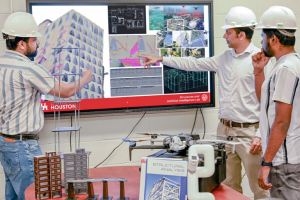By: Alex Keimig
Can artificial intelligence transform the practice of structural engineering?
Imagine a future where structural engineers not only rely on their own knowledge and experience, computational tools, or evaluation equipment, but also utilize powerful AI assistants to significantly boost their productivity. This vision is becoming a reality through a groundbreaking collaboration between the University of Houston and Purdue University, supported by the National Science Foundation (NSF).
"My team at UH and I have been developing deep learning, computer vision, and artificial intelligence solutions for varied structural engineering problems over the past decade," said Director of the Structures and Artificial Intelligence Lab Vedhus Hoskere, assistant professor of civil and environmental engineering (CEE) and electrical and computer engineering (ECE).
Other UH collaborators include Roberto Ballarini, Thomas and Laura Hsu Professor and Chair of the Department of Civil and Environmental Engineering, and Craig Glennie, Hugh Roy and Lillie Cranz Cullen Distinguished Chair and director of the National Center for Airborne Laser Mapping.
Continue reading at Cullen College of Engineering.
Related News:
Cullen Researcher Reveals Pre-Collapse Monitoring Of Kakhovka Dam, Ukraine
Glennie Leading Effort For $63.5M DoD Contract To Revolutionize Army Decision-Making


